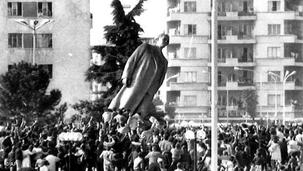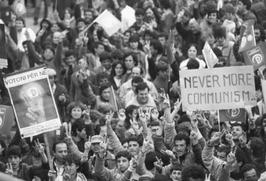The fall of communism
 Removal of Enver Hoxha statue
Removal of Enver Hoxha statue
The fall of communism in Albania, the last such event in Europe outside the USSR, started in December 1990 with student demonstrations.[1] March 1991 elections left the formerly communist Party of Labour of Albania in power, but a general strike and urban opposition led to the formation of a coalition cabinet which included non-communists. Albania's former communists were routed in elections in March 1992 amid economic collapse and social unrest.
Enver Hoxha, who ruled the Socialist People's Republic of Albania for four decades, died on April 11, 1985. In 1989, the first revolts started in Shkodra, where the people wanted to demolish Joseph Stalin's statue, and spread to other cities. Eventually, the existing regime introduced some liberalization, including measures in 1990 providing for freedom to travel abroad. Efforts were begun to improve ties with the outside world.
Enver Hoxha, who ruled the Socialist People's Republic of Albania for four decades, died on April 11, 1985. In 1989, the first revolts started in Shkodra, where the people wanted to demolish Joseph Stalin's statue, and spread to other cities. Eventually, the existing regime introduced some liberalization, including measures in 1990 providing for freedom to travel abroad. Efforts were begun to improve ties with the outside world.
Background
Ramiz Alia succeeded Hoxha, who died in 1985. Alia gradually introduced economic reforms and opened diplomatic ties with Western European countries.[2]
During the revolutions of 1989 many Albanians remained unaware of events due to the dearth of information within the isolated state. Most Albanians didn't even know that the Berlin Wall had fallen in November 1989.[3]
During the revolutions of 1989 many Albanians remained unaware of events due to the dearth of information within the isolated state. Most Albanians didn't even know that the Berlin Wall had fallen in November 1989.[3]
Start of opposition
Mikhail Gorbachev had adopted new policies of glasnost and perestroika in the Soviet Union in 1985. After Nicolae Ceauşescu, the communist leader of Romania, was executed during the Romanian Revolution of 1989, Alia knew that he might be next if radical changes were not made. He then signed the Helsinki Agreement which forced Albania to respect human rights. Under Alia, the first pluralist elections took place since the communists took power in Albania in 1944. Alia's party won the election of March 31, 1991.[4]
Nevertheless, it was clear that the transition to democracy would not be stopped. All leading members of the newly formed Democratic Party wore white coats during demonstrations, while Sali Berisha was heard thanking Ramiz Alia when meeting with the students, and was seen driving around Skanderbeg Square with a government vehicle.[5][6]
The communists managed to retain control of the government in the first round of elections under the interim law, but fell two months later during a general strike. A committee of "national salvation" took over but also collapsed within six months.[7] Alia resigned as president and was succeeded by Berisha, the first democratic leader of Albania since Bishop Fan Noli.
Nevertheless, it was clear that the transition to democracy would not be stopped. All leading members of the newly formed Democratic Party wore white coats during demonstrations, while Sali Berisha was heard thanking Ramiz Alia when meeting with the students, and was seen driving around Skanderbeg Square with a government vehicle.[5][6]
The communists managed to retain control of the government in the first round of elections under the interim law, but fell two months later during a general strike. A committee of "national salvation" took over but also collapsed within six months.[7] Alia resigned as president and was succeeded by Berisha, the first democratic leader of Albania since Bishop Fan Noli.
Post-communist government
 Anti-communist rally in Tirana
Anti-communist rally in Tirana
The change from dictatorship to democracy evidently had many challenges. The Democratic Party had to implement the reforms it had promised, but they were either too slow or did not solve the nation's problems, so the people were disappointed when their hopes for fast prosperity went unfulfilled. In the general elections of June 1996 the Democratic Party tried to win an absolute majority and manipulated the results.
The government collapsed in 1997 in the wake of additional collapses of pyramid schemes and widespread corruption, which caused disorder and rebellion throughout the country. The government attempted to suppress the rebellion by military force but the attempt failed, due to long-term corruption of the armed forces. Other nations' militaries were therefore forced to intervene to protect their own citizens, their diplomatic facilities, and other countries' citizens.
Pursuant to the 1991 interim basic law, Albania ratified its post-communist constitution in 1998, establishing a democratic system of government based upon the rule of law and guaranteeing the protection of fundamental human rights.
The government collapsed in 1997 in the wake of additional collapses of pyramid schemes and widespread corruption, which caused disorder and rebellion throughout the country. The government attempted to suppress the rebellion by military force but the attempt failed, due to long-term corruption of the armed forces. Other nations' militaries were therefore forced to intervene to protect their own citizens, their diplomatic facilities, and other countries' citizens.
Pursuant to the 1991 interim basic law, Albania ratified its post-communist constitution in 1998, establishing a democratic system of government based upon the rule of law and guaranteeing the protection of fundamental human rights.
Related videos
|
|
|
|
Also see
- Albanian Democratic Party
- Sali Berisha
References
- MISTERET E DHJETORIT 1990, TV Klan
- Lami, Remzi. "Albania: nine years after". AIM Tirana. Retrieved 21 November 2010.
- Albania and the European Union: the tumultuous journey towards integration. p. 21. Retrieved 2011-06-27.
- Journal of Democracy
- YouTube
- YouTube
- http://muse.jhu.edu/journals/journal_of_democracy/election_watch/v003/index.html#v003.3
